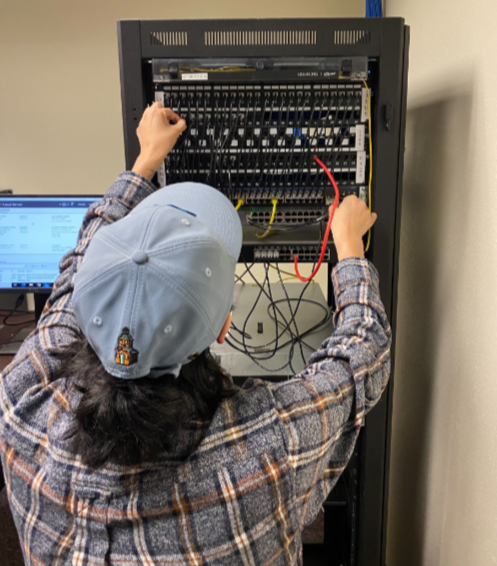Computer Technology
 The WVC Computer Technology department offers training programs for computer support
technicians, security specialists, network administrators and network engineers. By
completing coursework in the computer technology series, you can prepare for several
industry-recognized certifications including CompTIA A+, CompTIA Network+, Linux and
Microsoft Certified Systems Administrator (MCSA). Computer programming classes are
offered in Java, Javascript, HTML, PHP and MySQL.
The WVC Computer Technology department offers training programs for computer support
technicians, security specialists, network administrators and network engineers. By
completing coursework in the computer technology series, you can prepare for several
industry-recognized certifications including CompTIA A+, CompTIA Network+, Linux and
Microsoft Certified Systems Administrator (MCSA). Computer programming classes are
offered in Java, Javascript, HTML, PHP and MySQL.
The WVC Computer Technology Center is located in Brown Library. The computer labs feature up-to-date equipment that is configured to allow students to perform a variety of programming and networking exercises such as configuring a domain controller, network security, routing or setting up a Web server.
Core program courses may have prerequisite requirements. English and mathematics courses require qualifying assessment score or acceptable preparatory coursework on those subjects. See course descriptions for details.
Students who complete the Data Center/IT Support Technician Certificate of Completion will be able to:
- Work effectively, both independently and in groups, to solve computer hardware issues.
- Work effectively, both independently and in groups, to solve computer software and operating system issues.
- Diagnose and troubleshoot a variety of networking issues, from the physical layer through the application layer.
- Install, configure and troubleshoot a variety of client and server platform operating systems.
- Configure and support networks in a peer to peer network and a client server, domain-based network structure.
- Develop a foundation to continue their studies in computer technology and related fields.
- Acquire training and education to seek employment or advance in current employment in computer technology fields.
Students who complete the associate of applied science degree in Computer Technology be able to:
- Work effectively, both independently and in groups, to solve computer hardware issues.
- Work effectively, both independently and in groups, to solve computer software and operating system issues.
- Diagnose and troubleshoot a variety of networking issues, from the physical layer through the application layer.
- Install, configure and troubleshoot a variety of client and server platform operating systems.
- Configure and support networks in a peer to peer network and a client server, domain-based network structure.
- Recognize and work to prevent security issues such as viruses, denial of service attacks, and attacks from both inside and outside a network perimeter.
- Install and configure advanced Network Operating Systems (NOS), including configuration of domain controllers, group policy, replication, file sharing and security.
- Administrate networks: create user accounts and passwords; manage file permissions, user rights and security.
- Set up and configure a variety of roles for network operating systems, including File Server, Domain Controller, Web Server, Mail Server, FTP Server.
- Learn the fundamentals of open source operating systems such as Linux, including preparing for installation, dual-booting multiple operating systems, software installation fundamentals, configuration of network parameters, and operation of server in various roles (web server, FTP server, file services).
- Acquire training and education to seek employment or advance in current employment in computer technology fields.
- Develop a foundation to continue their studies in computer technology and related fields.


